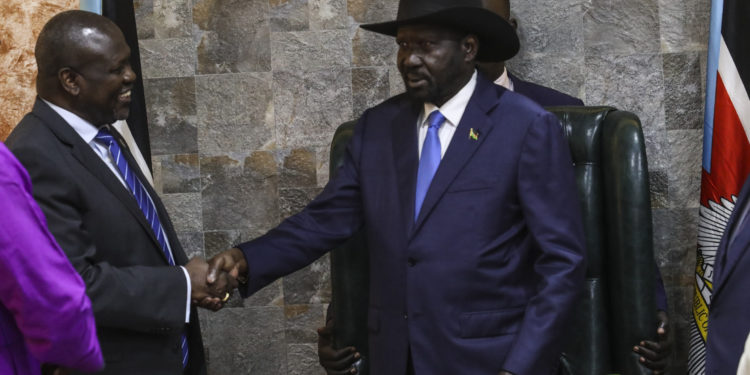The South Sudanese Government and several opposition groups have come to a peace agreement brokered by Roman Catholic group Sant’ Egidio.
In the declaration, the warring parties promised to enact the Cessation of Hostilities Agreement signed on December 2017 in Addis Ababa, Ethiopia putting an end to all hostile military actions, vandalization of public property and full compliance to humanitarian and international law.
“We solemnly declare to commit/recommit and adhere the Cessation of Hostilities Agreement of December 2017,” affirmed the leaders.The agreement was signed by the South Sudan Opposition Alliance led by Thomas Cirilo, South Sudan United Front/ Army, under the leadership of General Paul Malong Awan Anei and Pa’gan Amum Okiech, the leader of Former Detainees group. The deal will go into effect on January 15, 2020.
Leaders are positive that for the first time the main cause of civil conflicts has been addressed. “Saint’ Egidio offered us a very good environment, no prejudices whatsoever for the parties to discuss the real issues. We signed this Rome Deal because the Government accepted to discuss the root causes of the problem. Without discussing the root causes of any problem, you don’t solve the problem.” said Barnaba Marial Benjamin. Additionally, he was pleased that the Sant’ Egidio will be monitoring the progress of the agreement. He affirmed that the country was committed to inclusivity calling the declaration the cornerstone of the future of the South Sudan. The Vatican first hosted the political leaders in April 2019 where Pope Francis expressed his wish to facilitate peace talks among the principles.
“We came together here in appreciation to the tireless effort of His Holiness Pope Francis when he called the leadership of our country and begged them for peace,” said Pa’gan Amum Okiech, member of the leadership council of SSOMA and Interim Chairman of Sudan People’s Liberation Movement.
The peace deal is taken as a big step towards peace after previous failed attempts. In August 2018, South Sudan rebels refused to sign a peace deal, blaming the Government of imposing its own agenda. Finally, a month later a peace agreement was entered between President Salva Kiir and rebels offering a glimmer of hope to many, however the deal did not end the conflicts. The parties were to form a transitional government led by Salva Kiir with Riek Machar being the first vice president. Four additional Vice Presidents’ posts were also created. To date the government has not formed the interim government something that prompted the United States and United Kingdom to intervene.
“The United States is gravely disappointed with the failure of President Salva Kiir and Dr. Riek Machar to agree on the formation of a Revitalized Transitional Government of National Unity by the established deadline of November 12. Their inability to achieve this basic demonstration of political will for the people of South Sudan calls into question their suitability to continue to lead the nation’s peace process.” Read the statement released on the White House website. Kiir has since promised to form the government by 22 February 2020 after missing the earlier deadline.
The country has been embroiled in a humanitarian crisis and a recurring war that has claimed lives of nearly 400,000. A further two million people have fled to neighboring countries. Reports of human violations including torture, arbitrary arrests, sexual and gender-based violence, murder, looing and destruction of property have tainted the image of the country since it plunged in civil war in December 2013- less than two years after it gained independence from Sudan.
The South Sudan authorities have also been accused of harassing journalists in an attempt to muzzle the highly censored media industry. The United Nation documented at least 60 cases of intimidation, killings and unlawful detention of journalists. For example, the editor in chief of the Juba Monitor was summoned for publishing articles that were deemed to cast the government in negative light.
Last week US imposed restrictive measures on the country’s first vice President Taban Teng Gai over his alleged involvement in the killing of the opposition leader Aggrey Idri Ezibon and human rights lawyer Samuel Luak. The murders were alleged to be one his ploys to strengthen his position in the government and intimidate the opposition.
After issuing the sanctions, United States Secretary of State Mike Pompeo pledged with the government to distance themselves from political officials who may put future peace negotiations in jeopardy. In his statement, he said Gai acted on behalf of Kiir “to divide and sow distrust, extend the conflict in South Sudan, and impede the reconciliation and peace process.”







